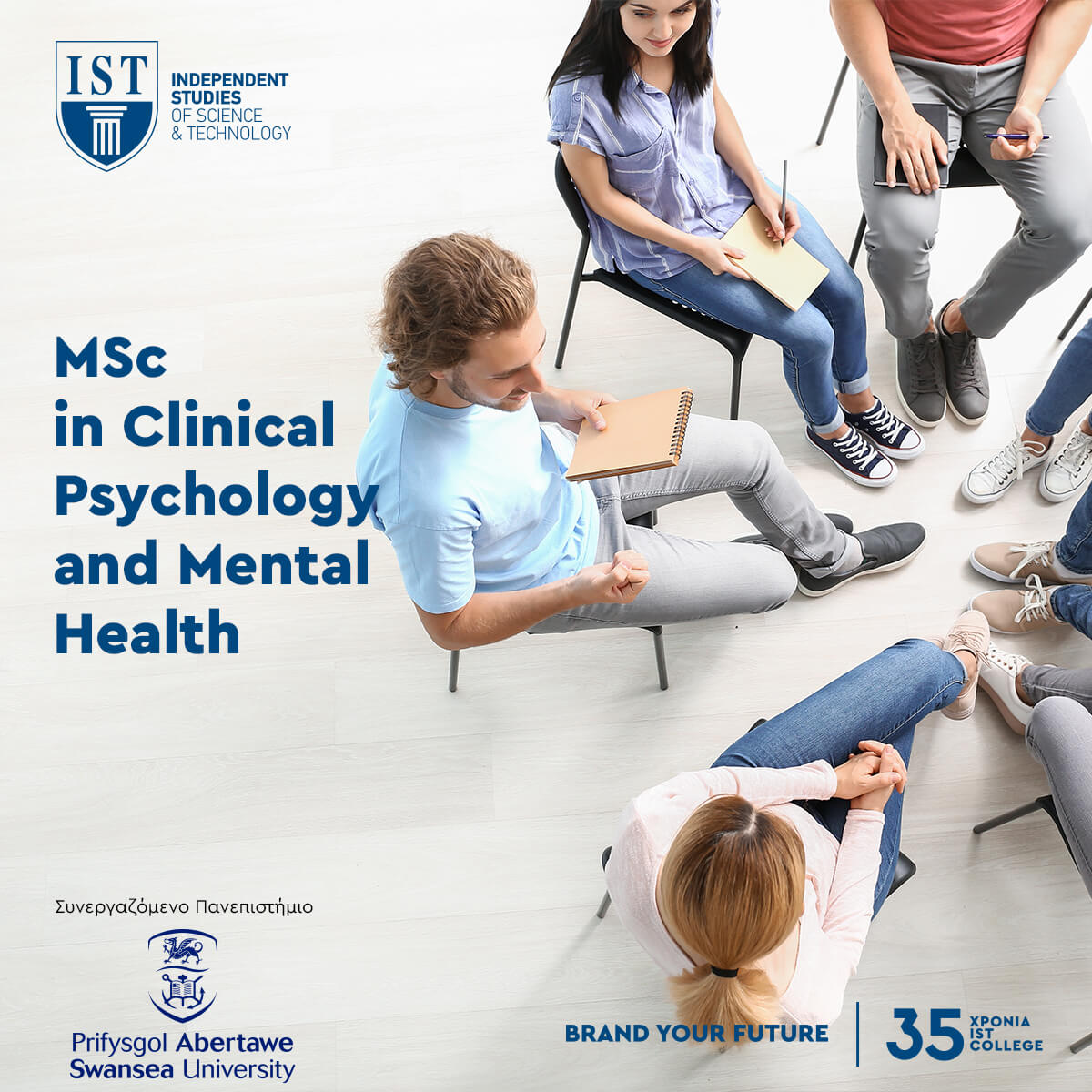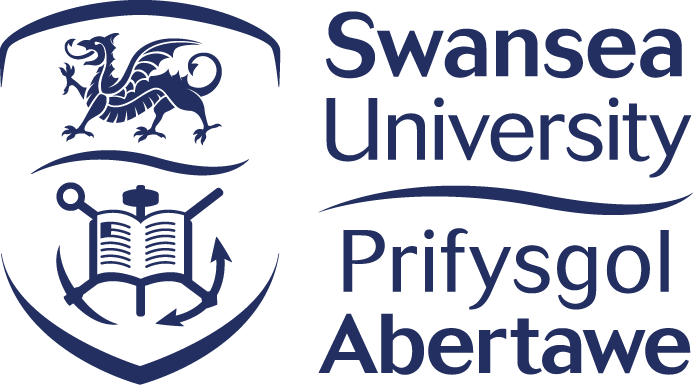
Duration
Full time-1 year
Μοde of Delivery
On site, Online
Language of Delivery
Greek
Start Date
October 2026
Location
Athens, Greece



Description
The MSc Clinical Psychology and Mental Health will equip you with a high level of understanding of the theory and practice of Clinical Psychology in healthcare settings, preparing you for professional clinical training at doctoral level. You will study key topics such as eating disorders, psychopathy, neuropsychology and psychotherapy, alongside basic statistical and research methods.
Throughout your studies, you will improve your critical research and analytical skills in relation to clinical psychology practice.
The Clinical Psychology and Mental Health MSc provides an in-depth understanding of psychological theories, practices and research methodologies. It equips students with advanced knowledge in areas such as psychopathology, psychotherapy and psychological assessment, enabling them to apply these concepts effectively in clinical settings.
Psychology at Swansea University is ranked Top 201-250 in the World (QS World University Ranking by Subject 2025).
Objective of the programme
- At IST College, you will receive a comprehensive and in-depth exploration of Clinical Psychology, guided by academics and clinical practitioners who bring a wealth of experience from both a theoretical and practical perspective.
- Learning from experienced practitioners can provide you with insights into the latest practice, research findings and theoretical developments in Clinical Psychology.
- The IST College programme structure can provide excellent networking opportunities with industry professionals and alumni.
- Because at IST College we take care to provide high quality, multi-level training as we give you the opportunity to attend accredited seminars alongside your studies at no extra cost, building not only a strong resume, but gaining practical knowledge.
Structure of the Programme of Studies
COURSE DESCRIPTION
This module provides an in-depth analysis of the current understanding of eating disorders (Psychogenic Anorexia, Psychogenic Bulimia, Episodic Overeating Disorder and Nocturnal Food Intake Syndrome). Key risk factors, maintenance and treatment of eating disorders are discussed.
EDUCATIONAL OBJECTIVES
- To distinguish the diagnostic subcategories of eating disorders
- Critically evaluate the theories concerning the aetiology and maintenance of eating disorders
- Critically evaluate evidence-based treatment for eating disorders and assess the outcomes
- Critically evaluate the evidence on the inclusion of obesity in the spectrum of eating disorders
COURSE DESCRIPTION
This module examines competing and complementary theories of the etiology of psychoses and options for biological and psychosocial treatment.
EDUCATIONAL OBJECTIVES
- Critically evaluate competing and complementary theories of the etiology of psychosis.
- Critically evaluate the relative strengths and weaknesses of biological and psychosocial treatment options.
- Articulate and critically evaluate the value of the antipsychiatric movement and its philosophical basis.
COURSE DESCRIPTION
Psychopathy is a serious personality disorder closely associated with violence and antisocial behaviour. This module covers the measurement of psychopathy, the aetiology of psychopathic traits and models of psychopathic behaviour from a biopsychosocial perspective.
Sexual assault is a major social problem. The module will examine how deviant sexual interests can occur and how these can be measured. It will discuss the issues of risk assessment of sexual offenders and the management/treatment of offenders.
EDUCATIONAL OBJECTIVES
You will learn about key issues in the development of the most prevalent personality disorders and sexual offending behaviour. The key issues that will be addressed are:
- A general model of sexual risk
- Etiology and treatment of pedophilia
- Overview and general models of personality disorder etiology
- Etiology and treatment of psychopathy/antisocial personality disorder
- Etiology and treatment of borderline personality disorder
COURSE DESCRIPTION
This module provides a comprehensive overview of statistical methods and research designs used in applied Clinical and Health Psychology. The module examines the parameters of ethical research practice and introduces students to the basic concepts and a limited number of qualitative methods commonly used in applied psychology.
EDUCATIONAL OBJECTIVES
- This module will review your knowledge of the fundamental principles and applications of statistical methods and introduce more complex statistical tests (e.g., nonparametric testing, ANOVA, MANOVA, factor analysis).
- You will consider the application of research design with specific application in practice (e.g. single case study designs, RCTs). You will consider the principles and rationale of research ethics and be introduced to the ethics of conducting research with vulnerable groups (children, older people, people with learning disabilities etc.).
- You will identify debates around the development of qualitative research methods and consider the advantages/disadvantages of different methods (such as grounded theory and IPA).
COURSE DESCRIPTION
This module will examine the development, maintenance and treatment of emotional disorders along with associated trauma responses such as Post Traumatic Stress Disorder. The module will examine these disorders from biological/genetic, social/family and psychological explanatory contexts. It will also critically review established and emerging theory-based interventions.
EDUCATIONAL OBJECTIVES
- Basic categorical approaches to classifying mental health conditions, with particular reference to adult emotional disturbances and post-traumatic stress disorder
- An overview of the field of emotional and post-traumatic stress disorder – prevalence, classification, diagnostic criteria and clinical presentation
- Theoretical models of adult emotional and post-traumatic stress disorder
- Effectiveness of standard and emergency treatments for anxiety, mood and post-traumatic stress disorder
- Complexities associated with therapeutic work with individuals presenting with affective disorders and posttraumatic stress disorder.
COURSE DESCRIPTION
This module will give you the basic skills necessary to understand, design and carry out research in psychology, and to interpret and report research results. Skills developed in this unit include: generating research hypotheses, internal and external validity, construct validity, research methods and questionnaire design.
EDUCATIONAL OBJECTIVES
• Critically evaluate psychological research
• Distinguish between narrative reviews, systematic reviews and meta-analysis.
• Create a research protocol, identifying and correctly applying the necessary elements.
• Justify the sample size required to achieve a reliable database.
COURSE DESCRIPTION
The workshop series will provide useful information to help students adapt, transition successfully, and thrive as graduate students. The workshop series will cover a range of topics to support students’ academic, personal and professional development.
EDUCATIONAL OBJECTIVES
- Communication skills
- Assessment skills
- Personal skills
- Organisational skills
- Research skills
COURSE DESCRIPTION
Consisting of three parts, this self-directed eLearning module will support students to settle into college and their course, helping them focus on their goals while teaching them new skills to succeed. They will examine college life and studies, including the use of time them at college, how to take charge of their own learning and where to turn for advice, guidance and support. Students will also receive a solid foundation in some essentials
academic skills, including different learning methods to help them thrive and practical advice on developing personal and their organizational skills. It is also important that they are introduced to the core values of good academic practice, such as how to demonstrate good academic integrity in their work, how to find their own voice, and different tools and strategies to avoid accidental plagiarism.
COURSE DESCRIPTION
Cognitive Neuropsychology is a discipline that combines the fields of Cognitive Psychology and Clinical Neuropsychology. It involves the use of cognitive models of physiological functioning to understand cognitive impairments observed in populations with brain injury – with the aim of achieving both a detailed understanding of the profile of a case study and the appropriate intervention for the case under consideration. Students will be taught about the functional anatomy of the cerebral cortex and how this information relates to the main methods of Cognitive Neuropsychology, and will also be introduced to the key clinically based theories underpinning understanding about various neuropsychological syndromes, such as aphasia and amnesia – knowledge that guides the rehabilitation methods available for populations with brain injury and the means by which appropriate rehabilitation interventions can be selected.
EDUCATIONAL OBJECTIVES
Students will be taught the types of cognitive disorders that can occur as a result of brain injury, their explanations through the models of Cognitive Neuropsychology and appropriate interventions and research based on case studies. This includes:
- An overview of the aims and approaches of the discipline of Cognitive Neuropsychology
- Aphasia – speech deficits as a result of brain injury, interventions and theories
- Amnesia – memory deficits as a result of brain injury, interventions and theories
- Ignorance – visual perceptual deficits as a result of brain injury, interventions and theories
- Executive functions – problem solving and planning deficits as a result of brain injury, interventions and theories
COURSE DESCRIPTION
This module describes the main principles and applications of behavioural psychology. It covers the key concepts underlying the approach to psychology and covers current developments in the field and their applications in clinical and educational contexts. Many of the applied examples given on behavioral intervention relate to Autism Spectrum Disorders and other developmental disorders, but other examples are given that come from adult fields. Emphasis is placed on the key components of empirically validated interventions.
EDUCATIONAL OBJECTIVES
- Critically evaluate the major themes and current issues in behavior analysis.
- Critically evaluate research methods and techniques used in Behavior Analysis.
- Critically evaluate recent published research.
- Formulate an intervention plan.
COURSE DESCRIPTION
This module deals with the psychology associated with vulnerability and protection from chronic physical illness. It then considers issues of adaptation to illness such as anxiety and coping, and psychological interventions to reduce distress and promote wellbeing.
EDUCATIONAL OBJECTIVES
- Critically explore the theory and evidence related to people’s vulnerability to chronic illness
- Critically evaluate appropriate theory for understanding the motivations for health-behavior and change
- Critically discuss psychological theory and its application to intervention in chronic health conditions
- Critically evaluate and synthesize psychological knowledge related to the field of illness
COURSE DESCRIPTION
This module will focus on the core skills required in the practice of psychotherapy and their use in clinical contexts. It focuses on developing theory-based clinical interventions using cognitive behavioural change and third wave strategies. You will learn about the key elements of second- and third-wave cognitive behavioral therapies from both theoretical and practical perspectives.
EDUCATIONAL OBJECTIVES
- To critically explore the key skills and therapist characteristics associated with positive and negative psychotherapy outcomes
- Critically evaluate the strategies required to obtain information relevant to the configuration of a mental health problem.
The research module involves the construction and execution of a research project, usually carried out in relation to a clinical research topic.
More information
- Hospitals: Employment in mental health units, outpatient clinics, psychiatric departments
- Community Mental Health Centers (CMHCs)
- Social Welfare Structures: Shelters, supported housing, rehabilitation centers, etc.
- Public schools / Special education
- Private Mental Health Centers / Clinics: Collaboration with psychiatrists and other professionals
- Private Practice (with official license to practice): Provision of psychotherapy, psychological assessments, etc.
- Digital Mental Health Services: Online therapy platforms, mental health apps
- Partnerships with nurseries, schools, NGOs, companies, interdisciplinary child support centers
- Teaching in IEK / Colleges / Lifelong Learning Programs
- Research: Participation in research projects or academic career paths
- Structures for vulnerable social groups
- Participation in NSRF (ESPA) programs or internationally funded initiatives (e.g. UNHCR, UNICEF)
- Psychological evaluation / testing: In diagnostic, educational, or private settings
- Supervision / Consulting: For health professionals or educators
- Writing / Publishing / Psychological seminars: For the general public or professionals
- Degree in Higher Education (TEI, TEI, Colleges, etc.) from National and/or International Institutions.
- In some cases, candidates who do not have a first degree but who have significant professional experience may be admitted to the programme, after an interview.
- IELTS English language certificate, or other equivalent level certificate.
You can register in the following ways:
Α) Online
You can download the registration form here and send it completed to admissions@ist.edu.gr,along with the necessary registration documents (to view them click here) and proof of deposit (to view the bank accounts click here.)
B) By visiting IST College
The IST College Administrative Staff will be at your disposal to help you register. All you need is to come to IST College, bringing with you the necessary registration documents, to view them click here.
In addition, your Education Advisor will inform you about the financial and social criteria that will secure you a tuition fee subsidy of up to 30%, supported by the IST College Student Support Fund.
You can also apply for one of the Scholarships offered by IST College, announced periodically by IST College, in collaboration with well-known companies and organisations. For more information click here.
It is important to note that by paying your tuition fees, apart from attending the courses, you will also enjoy a range of privileges and services at no extra charge such as:
- Registration
- Use of the IST College Library
- Participation in the Examinations
- Use of the IST College Modern Education Platform
- Issuance of all certificates of study, grades and certificates from both IST College and the partner university
- Participation in seminars, events and conferences organised and offered by IST College
- A card that ensures preferential prices in college-affiliated shops of various sectors and services
Download the Study Guide (here)
You may also be interested in:
The Global MBA programme is designed for individuals seeking to develop a global understanding of the business world.
Postgraduate
MSc Computer Science enables you to develop your skills and gain computer science expertise at postgraduate level.
Postgraduate
The programme is strategically oriented, with the goal of equipping you to manage increasing complexity.
Postgraduate
The Global MBA programme is designed for individuals seeking to develop a global understanding of the business world.
Postgraduate
MSc Computer Science enables you to develop your skills and gain computer science expertise at postgraduate level.
Postgraduate



